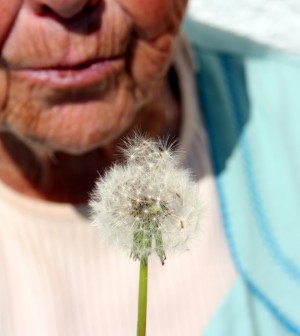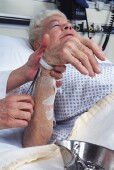- Could Artificial Sweeteners Be Aging the Brain Faster?
- Techniques for Soothing Your Nervous System
- Does the Water in Your House Smell Funny? Here’s Why
- Can a Daily Dose of Apple Cider Vinegar Actually Aid Weight Loss?
- 6 Health Beverages That Can Actually Spike Your Blood Sugar
- Treatment Options for Social Anxiety Disorder
- Understanding the Connection Between Anxiety and Depression
- How Daily Prunes Can Influence Cholesterol and Inflammation
- When to Take B12 for Better Absorption and Energy
- Epsom Salts: Health Benefits and Uses
Some Medicare Advantage Plans Raising Hospital, Nursing Care Copays


Millions of older Americans with Medicare Advantage plans face large out-of-pocket costs for hospital stays and skilled nursing care, according to new research.
“Policymakers are very concerned about how much Medicare beneficiaries need to spend for essential medical services,” study corresponding author Dr. Amal Trivedi, an associate professor of public health at Brown University in Providence, R.I., said in a university news release
“It’s one of the goals of insurance — to protect people from large, catastrophic out-of-pocket expenses,” Trivedi said.
Researchers reviewed the records of more than 8 million Medicare Advantage enrollees. The study participants took part in more than 1,800 different Medicare Advantage plans. The researchers looked at the pricing structures of their plans before and after federal policy changes took effect in 2011. These changes were designed to help protect consumers.
The changes restricted some copays, or cost-sharing. They also imposed a limit of $6,700 on total out-of-pocket costs for Medicare Advantage plans. Plans that agreed to an even lower cap of $3,400 had more flexibility in how they could overhaul their cost-sharing. Traditional Medicare has no cap on out-of-pocket expenses, according to the researchers.
Researchers calculated what the average American would have to pay for hospital stays and skilled nursing care based on their plan.
Following the policy change, fewer than one-third of Medicare Advantage members in low premium plans that already had an out-of-pocket limit faced higher copays for hospital or skilled nursing care. More than one-third had a reduction in copays, the researchers noted.
But among those covered by plans with new out-of-pocket caps, however, 55 percent had increased copays for hospital stays and 46 percent had higher copays for skilled nursing. Fewer than one in six of members in plans with new out-of-pocket limits had lower cost-sharing.
On average in 2011, older people with lower premiums under Medicare Advantage plans were expected to pay $1,785 for a week in the hospital and about three weeks in a skilled nursing facility. The researchers noted these services are common occurrences following serious health issues, such as a stroke, congestive heart failure or a broken hip.
Even those who paid higher monthly premiums faced an average copay of $1,446, the study found.
Those who received federal subsidies because their incomes fall below a certain threshold faced the same high copays for Medicare Advantage plans, the researchers noted.
“For low-income beneficiaries, these copayments for inpatient and skilled nursing care could be more than a month’s worth of income,” said study author Laura Keohane, a Brown doctoral student, in a university news release.
By comparison, someone with traditional Medicare would pay $1,132 for those services, along with physician copayments for services received in the hospital.
“The perception out there is that Medicare Advantage offers more generous benefits than traditional Medicare without supplemental coverage, but for long inpatient stays and long stays in a skilled nursing facility, that’s generally not the case, we found,” Trivedi said.
Medicare Advantage copays were lower than those of traditional Medicare for shorter hospital stays, the researchers pointed out. The average costs for a three-day admission were $544 for low-premium plans and $511 for those with higher premiums.
The researchers concluded the overall cap on out-of-pocket costs issued in 2011 may have caused many plans to increase copays for hospital and skilled nursing care. As a result, older people in poor health facing higher copays for hospitalization may be discouraged from enrolling in some Medicare Advantage plans.
The study authors said policymakers should determine if more needs to be done to protect Medicare Advantage consumers, particularly low-income seniors, from high out-of-pocket costs for unpredictable medical problems that require long hospital stays and skilled nursing care.
The study was published in the June issue of Health Affairs.
More information
The U.S. Centers for Medicare & Medicaid Services provides more information on Medicare Advantage plans.
Source: HealthDay
Copyright © 2026 HealthDay. All rights reserved.










